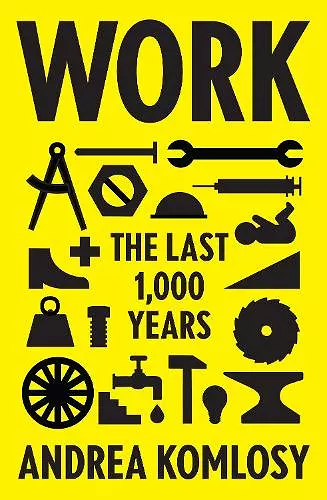Work
The Last 1,000 Years
Andrea Komlosy author Jacob Watson translator Loren Balhorn translator
Format:Hardback
Publisher:Verso Books
Published:27th Mar '18
Currently unavailable, our supplier has not provided us a restock date

Tracing the complexity and contradictory nature of work throughout history
By the end of the nineteenth century, the general Western conception of work had been reduced to simply gainful employment. But this limited perspective contrasted sharply with the personal experience of most people in the world-whether in colonies, developing countries or in the industrializing world. Moreover, from a feminist perspective, reducing work and the production of value to remunerated employment has never been convincing.
Andrea Komlosy argues in this important intervention that, when we examine it closely, work changes its meanings according to different historical and regional contexts. Globalizing labour history from the thirteenth to the twenty-first centuries, she sheds light on the complex coexistence of multiple forms of labour (paid/unpaid, free/ unfree, with various forms of legal regulation and social protection and so on) on the local and the world levels. Combining this global approach with a gender perspective opens our eyes to the varieties of work and labour and their combination in households and commodity chains across the planet-processes that enable capital accumulation not only by extracting surplus value from wage-labour, but also through other forms of value transfer, realized by tapping into households' subsistence production, informal occupation and makeshift employment. As the debate about work and its supposed disappearance intensifies, Komlosy's book provides a crucial shift in the angle of vision.
As Andrea Komlosy argues in Work: The Last 1,000 Years, our conception of what constitutes work has changed markedly over time. The professor of social history at the University of Vienna writes that our commonly accepted definitions are too narrow, too European, too male and too modern -- John Thornhill * Financial Times *
Komlosy's book is deeply researched, lucid and persuasive. -- Joe Moran * Times Literary Supplement *
Komlosy's analysis is a helpful reminder that our familiar understanding of work is narrow and historically exceptional. The hierarchy we have established in the industrialized West, placing permanent, full-time, legally contracted wage work at the top of a pyramid of social good, is deeply flawed-denigrating not only those millions who work outside its confines, but also devaluing and neglecting the kinds of nonwork activities that enrich and give meaning to human lives. By showing that "work" may exist without wages, a boss or a workplace outside the home, Komlosy's analysis allows us to think more broadly about what we value, and whether we want to continue to separate work and life. -- Joanna Scutts * In These Times *
Andrea Komlosy has written an important book on the global history of work during the past 800 years. Looking at particular moments (1250, 1500, 1700, 1800, 1900, 2010), she charts how understandings of work and work practices have shifted-from household focused subsistence labor to the widespread commodification of labor in various forms. Her two most important contributions are that she thinks about labor on a global scale, thus overcoming a deep Eurocentric bias in much of the labor history as it exists, and that she brings feminist conversations on labor into an analysis of virtually all aspects of labor history. Her book is unique, I am not aware of any other such volume. -- Sven Beckert
This is a book teeming with insights, from the contempt for manual labour in ancient Greece to the historical tendency for all kinds of subsistence tasks to be "housewife-ized" into unpaid domestic labour. -- Barbara Kiser * Nature *
Written in well-defined thematic sections that give the reader a thorough understanding of how labour as well as labour profiles have changed over the ages. * Down To Earth *
The theoretical and historical scope of the book is impressive. * Insight Turkey *
In Work, Komlosy, an economic and social history professor at the University of Vienna in Austria, provides a sweeping overview of how ideas and definitions about work have evolved over the last 1,000 years, calling out the very limited conception of work offered by traditional labor studies and Marxist perspectives.Komlosy's book is ambitious in its brevity: she condenses a millennium of global history into just 225 pages, justifying her far-reaching geographic and historical scope as necessary for avoiding the Eurocentric and patriarchal biases in traditional conceptions of work. -- Lauren Kaori Gurley * Indypendent *
Capturing this churn [in both work itself and our ideas about it] is the difficult task that historian Andrea Komlosy attempts in her new book Work: The Last 1,000 Years..Komlosy attempts the monumental task of writing a large-scale global history of labor adequate to the growing instability in how we define and participate in work. -- Gabriel Winant * The Nation *
A fascinating book -- Laurie Taylor * Thinking Allowed *
ISBN: 9781786634108
Dimensions: 235mm x 156mm x 25mm
Weight: 539g
272 pages